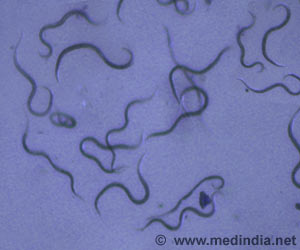Schistosomiasis is transmitted via flatworms shed by the freshwater snails that serve as the parasite's non-human host.

‘A newly identified protein, known as Grctm6, seems to prevent the snails from shedding at least some of the parasites that could go on to infect people with schistosomiasis.’





Schistosomiasis is transmitted via flatworms shed by the freshwater snails that serve as the parasite's non-human host. Researchers have identified a protein that shows promise as a biocontrol weapon against schistosomiasis.
The newly identified protein, known as Grctm6, seems to prevent the snails from shedding at least some of the parasites that could go on to infect people working or playing in the water where the snails live, said the study published in the journal PLOS Neglected Tropical Diseases.
"Shedding none would be great, but shedding fewer could still feasibly make a difference," said the study's corresponding author Euan Allan, a postdoctoral scholar at Oregon State University College of Science in the US.
"If snails are releasing a smaller number of parasites into the environment, people are less likely to be infected," Allan explained.
Advertisement
"The real take-home of the work is that we've discovered a completely new protein that's never been discovered in any other species. And this protein is involved in the extent of infection in an intermediate species, and potentially involved in the extent of human infection," Allan said.
Advertisement












